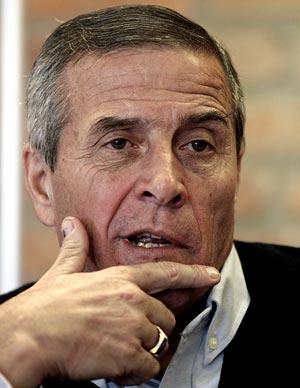
Made up of 36 thick brown leather panels, a faded white lace, and encased in a transparent box, it is surrounded by sepia photographs, 80-year-old newspaper cuttings and ancient boots -- distant reminders of Uruguay's rich past of two Olympic and two world titles between 1924 and 1950.
Uruguay's 2010 World Cup coach Oscar Washington Tabarez, however, is adamant his team, representing a small country of 3.5 million people, would not dwell on that past when they head to South Africa for the June 11-July 11 finals.
"I think we're on the right track in that we have very clear ideas as to what a World Cup is," the 63-year-old said in an interview surrounded by the memorabilia.
"I think my players know (what a World Cup means) and they will know it at the right moment."
Uruguay have been drawn in Group A for the finals where they meet 2006 finalists France, hosts South Africa and finally Mexico in the group stages.
Tabarez, who also took the side to the 1990 finals where they lost to hosts Italy in the second round, said he could draw from that experience to try and improve his team's preparation for South Africa.
"So far, in the World Cups since 1970, we've not done well in the finals so this is a new chance to try to improve," he said in reference to Uruguay reaching the 1970 semi-finals in Mexico but falling in the first round in 1974 and 2002 and second in 1990.
"We're convinced we'll get (to South Africa) in the form that matches our expectations, to get through the first round fundamentally from the first match," Tabarez said.
"That will be difficult because any of the four teams has the potential and any can be eliminated, which I don't see in the other groups."
Uruguay needed 20 matches to reach the 2010 finals after finishing fifth in the 10-nation, 18-match South American group following a 1-0 defeat at home by Argentina that sent Diego Maradona's team through.
They then survived a two-legged playoff against fourth place CONCACAF team Costa Rica, winning 2-1 on aggregate after a nerve-racking 1-1 draw at home in the decider.
"On an emotional level, the qualifiers are more difficult (than the finals) because you're up against the possibility of pursuing a dream or being left empty-handed," said Tabarez, an urbane former Montevideo schoolmaster.
"So the climate at a World Cup is not the same, but it's more demanding in terms of the rivals you could meet, especially from a possible second phase.
"To play against one of those rivals and win is to go down in history."
Tabarez said a World Cup always produced a surprise team and pointed to the likes of North Korea in 1966, Cameroon in 1990, Croatia in 1998, Turkey and South Korea in 2002.
"So far, none of the surprise (teams) has won the world championship ... I have the hope that we can be a surprise.
"If we are, we'll have things that the other surprise teams didn't have because of our history."